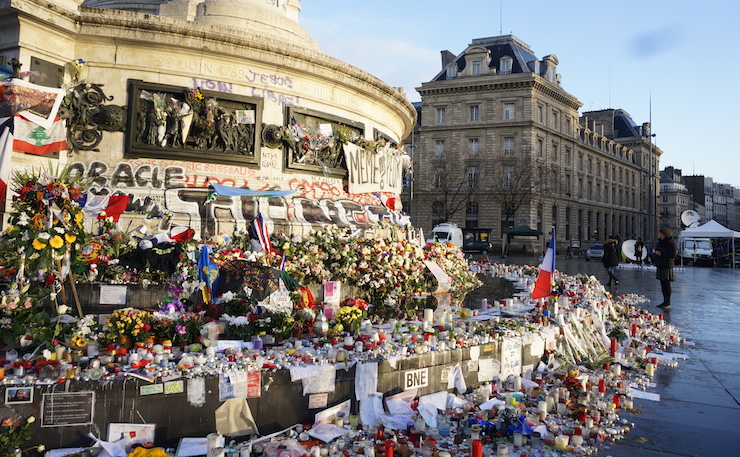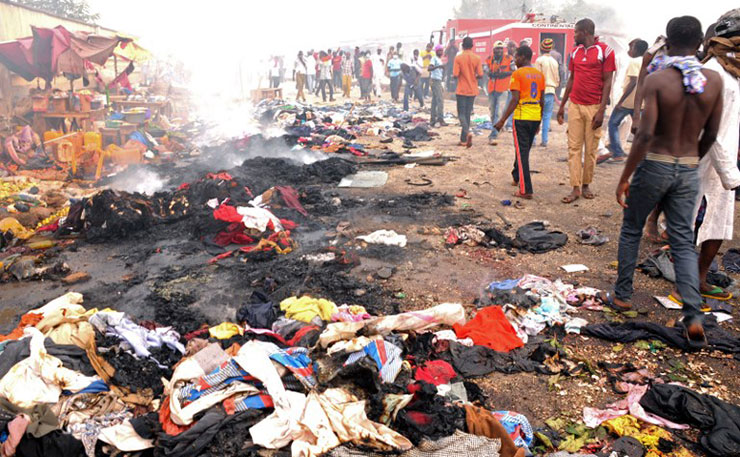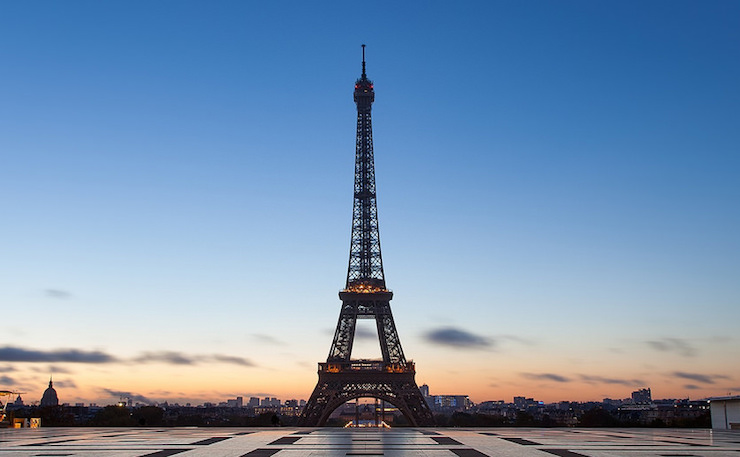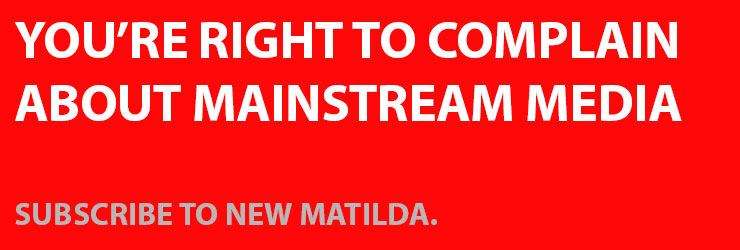Parisian intellectuals and artists are violently beating the French government’s war-drums. What’s happened to critique in the home of intellectuals? In Paris, Nick Riemer is following the debate.
With the immediate trauma of the Paris attacks receding, the West’s latest war on terror remains the object of substantial public consensus in France, both in its military and its domestic ‘security’ components. Fear, shock and panic are not the only reasons.
The government’s choice to throw further oil on the fires of the Middle East, and exacerbate already inflamed community tensions in France itself entails serious risks.
Given the freshness of the lessons of recent US wars and their calamitous civil liberties aftermath, and given extremely low levels of confidence in the French political system and its actors, the government’s decisions have necessitated the strong support of opinion leaders – the public intellectuals, artists, academics, and writers with access to the mainstream press.
There has been no shortage of such support. In the ideological rallying of the middle class behind the ‘national’ – or sometimes even ‘sacred’ – Republican union decreed by the Assemblée nationale, French social democracy has demonstrated its incapacity to offer any effective counterweight to a politics of bombs abroad and authoritarian crackdowns at home.
Western imperialist violence in the Middle East, or the deepening of social fractures domestically, are both to be tolerated, since they can be presented as the consequence of ‘Republican’ ideals of human rights, equality, liberty, or culture.
Against the widespread propagandizing for these ideals, critique and disturbance of certainties, the stereotypical duties of intellectuals and artists, have also been discharged – up to a point. But, as a local commentator recently noted in relation to the media’s coverage, criticisms of government policy “rarely get the top spot. They come out in the corners, as a bonus or surplus, drowned out by the salvos of Marseillaises.”
Intellectuals’ after-sales service for the government’s war offers a reminder of the strength of the illiberal, martial and chauvinistic tendencies latent in the upper echelons of civil society, including in the intellectual and cultural worlds.
Rage and war
After November 13, François Hollande’s government adopted a series of authoritarian state of emergency measures that massively amplify police powers and restrict public liberties, including the right to protest. The laws permit the dissolution of groups deemed a threat to public security, allow the closure of theatres and meeting places and the banning of meetings.
In certain circumstances, they make it legal to strip bi-nationals of French citizenship.
These measures command consensus throughout politics. The reformist Front de Gauche and the Parti Communiste both voted to extend the state of emergency for three months; only six deputies out of 577 refused. Already, there is talk of extending it. As the far-right Front National (FN), widely tipped to win control of two of the 13 French regions in elections on December 6 and 12 has itself noted, the measures represent a wholesale mainstreaming of the politics it has been demanding for years.
For years, too, French intellectuals have spread, and defended, the dissemination of far-right positions under the cover of respect for ‘Republican’ prerogatives. In the France of 2015, these public intellectuals are no spent force. Intellectual authority constitutes an autonomous domain of state power, memorialized in the streets and parks named after the protagonists of France’s official cultural history.
Philosophers, writers and academics dominate the opinion columns of the serious press. After November 13, they have deployed the full ideological arsenal of Republican values in order to justify the government’s adoption of a far-right policy agenda.
Being attacked, even as bloodily as France has been in 2015, does not entail that a country is at war. Especially when waged against a state’s own citizens, war is incompatible with democracy.

Nevertheless, novelists, essayists and philosophers have taken to the pages of the mainstream press to echo Manuel Valls and Marine Le Pen’s calls for a war to ‘annihilate’ Islamic State. In the name of the highest values of Western civilisation, public intellectuals have emphasized the necessity of ‘war’, ‘rage and war’, or ‘destruction’. Foreigners, often Americans, have been enlisted in support.
Ayaan Hirsi Ali has recommended that not just France, but all Europe put itself on a “war footing” to destroy Islamic State; to combat terrorism, she says, France should learn lessons from Israel.
Having decried them for years, many intellectuals are now finding that the US’ actions after 9/11 weren’t perhaps that bad after all: a political philosopher, for instance, has demanded a local Patriot Act, and called for an undefined category of ‘enemy’ to be ‘systematically locked up’ in French-style Guantanamos, “for as long as the war lasts – for life, if necessary”.
The calls for the ‘rearmament’ of France, to use the FN’s Marine Le Pen’s expression, are regularly expressed through the ordinary mythology of French Republicanism. According to novelist and journalist Marc Lambron, elected to the Académie française last year, France represents ‘a culture of refined warriors’: battle is inscribed in the nation’s very essence. War need not even be militarily effective to be justified: a historian notes in Libération that, whether they succeed not, military strikes have the advantage of “not encouraging the idea that the enemy is invincible”.
Any attempt to bring the categories of empirical academic analysis to bear on the situation France finds itself in is rejected. In Marianne, the editorialist Joseph Macé-Scaron poured scorn on what he called a ‘learned’ sociological explanation of Islamist radicalisation, centred on Western social breakdown. His sarcastic dismissal: ‘The West: what a bastard’.
On radio the week after the attacks, the Parti socialiste (PS) deputy Malek Boutih likewise discounted ‘sociological’ explanations for Muslim youth’s turning to jihadism. Paul Berman explained to Le Monde that ‘there are no sociological causes of jihadism’. For the far-right, trying to understand the terrorists is ‘the role of a social worker, certainly not that of the Justice Minister’.
Marcel Gauchet, a distinguished philosopher and historian, sees economic and social factors as mere triggers: the basic cause of the attacks is a religious one. It is entirely characteristic of this kind of idealism that Gauchet does not mention the obvious implication: as a basically religious or cultural problem, France does not have to engage in any deep soul-searching about the material effect of its domestic or foreign policies.
For Eric Marty, professor of French literature at a major Parisian university, ‘believing that the meaning of Islamic State lies in the failings of Western politics in the Middle East is as ridiculous, and no doubt as self-interested, as believing that the meaning of Auschwitz lies in the treaty of Versailles’.
Culture versus the jihad
To a political interpretation of the attacks, centred on the West’s interventions in the Muslim world, and the effects of France’s disastrous domestic policies to Muslims, an idealist fantasy is preferred. ‘These attacks,’ the Egyptian novelist Alaa El Aswany wrote in Le Monde, “symbolize the combat between civilization and barbarism, between culture and fanaticism, between tolerance and terrorism”.
This analysis is ubiquitous: since the day after the attacks, the government’s cheerleaders have alternated ringing calls to arms with indiscriminate self-congratulation on the achievements of French civilization.
In the analysis of a former minister of culture, Jean-Jacques Aillagon, the attacks emanated not from a bloody history of Western bombs, invasions, and domestic exploitation, but from “islands of resistance to civilization, to modernity, to critical thought”.
Alain Finkielkraut has read the social problems of Moelenbeek, the area of Brussels heavily implicated in the launching of the attacks, as the result of a “cultural secession”.
Such cultural analysis is pervasive and, apparently, inexhaustible. The Figaro opened its columns to a historian attributing France’s failed social integration to the lowering of ‘national and cultural requirements’. A philosopher explained the terrorists as “kids that video games weren’t enough to distract from the cosmic void of their existence”. The PS’s Malek Boutih identified French Republican culture with libraries: the ‘human securitization’ of the French population, he added, has to be accomplished through education and culture, against the domination of rap music and iTunes. A literary critic explained on radio that the attacks left him with no choice but to speak of literary prizes, as a signal emblem of French civilization, citing a spurious translation of Boko Haram as ‘ban on opening books’.

This cultural chauvinism has an overt link with class antagonisms, and has real political consequences. Valérie Pécresse, the head candidate in the Ile-de-France region for Sarkozy’s right-wing Les Républicains (LR), linked Islamists with youth who paint graffiti in public transport, thereby stigmatizing popular culture as both criminality and terrorism. As she told the Journal du dimanche on November 22,
I remain persuaded that it’s by bringing culture and artists’ message everywhere, to every area, to the whole population, from the earliest age, that we will reconcile our society.
When it comes to governments’ funding priorities, however, ‘culture’ overwhelmingly refers to the preferred artistic expressions of the middle classes, as 2013 figures from the French Observatory of Inequalities show. In a context where the right is insistent that higher security must not aggravate the national deficit, the 20 per cent increase in cultural spending Pécresse is promising could only come at the expense of social programs. The traditional role of cultural spending – reinforcing class divides – is thereby compounded.
Celebration of the achievements of French culture goes hand-in-hand with a bald nationalism. For Marianne, internationalism is a confabulation of miserable intellectual and cultural elites. The respected novelist Christine Angot, winner of this year’s December prize, celebrated the dissolution of individual identity in French Republicanism, with Muslims the first group to be stripped: “We’re not Muslim, we’re not Jewish, we’re not Catholic, we’re not white, we’re not male, we’re not female. We play in a team, and our team is France.”
As a totalizing vision, this national identification brooks no scepticism. Any doubts about French culture – “our linguistic fatherland, our saints and heroes, our culture”, as the novelist and diplomat Daniel Rondeau put it – is seen as a factor of weakness that empowers the ‘enemy’.
The singer Magyd Cherfi told Libération that there are days “where you’d like to be called Dupont when your name’s Magyd”; “days where even if you’re an anarchist your wear a flag because that’s all there’s left to wave after the fire and it’s blue, white and red”. He then declared himself ready to accept a number of well-known right-wing intellectuals and politicians, including the National Front and Marshal Pétain – simply because, like him, they are French.
This goes along with a blatant Islamophobia. “Islamic civilization” as a whole “is the sick man of global civilization, and Islamic State is just its worst symptom,” claimed Abdennour Bidar in Libération. French Muslims have repeatedly been called on to prove they don’t support jihad, or to abandon ‘non-secular’ clothing. Logically, the rechristianisation of France has also been demanded.
As forthright opponents of Islamophobia, it follows that the far left have also found themselves the object of ferocious criticism: nothing less than the ‘liquidation’ of ‘Islamo-leftism’ has been called for by the lawyer and writer Gilles-William Goldnagel, president of the France-Israel association. The violence of this call was not confined within one of the boutique organs of the far right, but published by the major right-wing daily Le Figaro. Raids and house-arrests against climate activists occurred around France in the lead-up to the opening of the climate summit.
A range of media, from Marianne and Charlie Hebdo to antlantico.fr, claimed, entirely falsely, that far-left groups like the Nouvel parti anticapitaliste (New anticapitalist party) and Lutte ouvrière (Workers’ struggle) have legitimated, excused, or refused to condemn the attacks. Given that it is only on the far-left that concrete resistance to war and the security state is being organized – 58 activists who participated during the banned refugee demonstration on November 22 have been summonsed by the police, and some charged; 174 were charged at Sunday’s climate demonstration – these condemnations reveal the insistence with which the media has closed ranks behind the PS/LR/FN political consensus.
Republicanism – the all-purpose ideology of the French ruling class
At the very moment that, in the name of fighting terror, the French state is devastating Raqqa, arresting refugee activists, banning climate demonstrations, and giving police the power to conduct home-invasions without a warrant at any hour for three months, the political classes’ propagandists have rallied French society behind them under the banner of defence of Republican ‘values’ – liberty, equality, fraternity, democracy, civilization, human rights.
In this situation, the nature of Republicanism as the all-purpose ideology of the French ruling class emerges clearly. Republicanism can be harnessed to justify anything that aligns with the interests of French state power. In the name of Republican values, France can criminalize BDS, hold up racist caricature as an exemplary exercise of free speech, or seriously contemplate censorship of the media. The present wholesale and disproportionate extension of the state’s coercive powers, opposed even by the Human Rights League, can be justified as guaranteeing the ‘greatest human right’ – security.
Already numerous left climate activists have been placed under house arrest. It is no surprise that criticisms of these measures do not themselves typically mobilize Republican discourse: unsupported by the authority of the state, this kind of rhetorical gesture would ring hollow.
In his important study Neither right not left: Fascist ideology in France, Zeev Sternhell traces the spread of fascist positions in the 1920s and ‘30s through the complicity, indifference or active support of the major institutions of liberal democracy. It is not an exaggeration to say that related processes can be observed today.
It would not be right, however, to tar all artists and public intellectuals indiscriminately as the ‘guard dogs’ of elite hegemony, ready to countenance serious affronts to democracy. Like other social categories, intellectuals and artists are not unified, and are characterized by numerous ideological and other differences. As any survey of the French press demonstrates, acquiescence to the Elysée’s political line is far from universal.
On the institutional level, however, any contestation has been largely dampened. Media outlets strengthen their support for politicians’ domestic and foreign warmongering precisely by entertaining, and mainly rejecting, serious criticism of it. Invited by Le Monde as the expert respondent in an online forum titled ‘Are liberties threatened by the state of emergency?’, the historian François Saint-Bonnet hosed down concerns about the measures in response to readers’ questions. In miniature, this is typical of the role that the press has played so far.

(IMAGE: Darren Flinders, Flickr)
It has, of course, every reason to do so. Serge Halimi has extensively documented French journalists’ collusion with political power. The major papers are, furthermore, heavily subsidized by the state. The Figaro, the most rightwing of the major French dailies, belongs to the arms dealer and industrialist Serge Dassault, who owns the company that makes the Rafale fighter-bombers currently deployed in the Middle East. Twenty-four more planes have just been sold to Qatar, one of the principal funding sources for radical Islamism. Dassault will no doubt profit handsomely from any escalation in France’s engagement in Syria.
Spectators to politics
There is a further level on which the profusion of opinioneering in the mainstream media functions to inhibit opposition to the disastrous course set by the French political classes.
Analysis and opinion can most directly engage with the levers of social change if they are construed as preludes to action. Such an orientation is largely alien to the modes of political commentary disseminated in the mainstream press.
Even strong condemnation of politicians’ decisions is typically couched in a confessional mode, as the isolated reasoning or cri de cœur of an individual conscience. As such, analysis or opinion takes on a purely expressive role which substitutes for concrete opposition, rather than functioning as a prelude for it.
The reader, like the writer, is cast as a spectator to politics, not as a potential participant. Only a handful of figures from the intellectual world have openly called for defiance of the bans on the climate demonstrations: doing so aligns them with the disreputable – in mainstream terms – far left; most intellectuals, accordingly, have not registered any protest at the state’s assaults on a fundamental right.
In their collective reluctance to link contestation with material possibilities of political resistance – demonstrations, petitions, other forms of collective action – critics of France’s national union for war are a symptom of the same idealism – the belief in the importance of abstract ideas, considered as valuable independently of their material consequences – that fuels faith in Republicanism itself.
Conviction in the utility of political analysis as an end in itself is a manifestation of the same mindset for which affirmations of the abstract principles of ‘liberty’, ‘equality’ and ‘fraternity’ are what count most, regardless of their actual political consequences.
In the months before the attacks, the opinion pages of the media had contained numerous rehearsals of the ideological manoeuvres that went into overdrive after November 13. The leading debates of September and October were focused not on the Middle East or Islamism, but on domestic politics and the likely electoral victories of the Front National.
A few weeks before the attacks, the magazine Marianne – vehicle of a reformist left nationalism – held a public meeting to defend what it saw as threats to free debate in France. The trigger was a controversy aroused by the position on the refugee crisis taken by the philosopher Michel Onfray, a major public celebrity.
Onfray had been attacked in the newspaper Libération by its editor, Laurent Joffrin, for a variety of reactionary comments on refugees – including casting doubt on the authenticity of the viral image of the drowned Syrian child Alyan Kurdi – and their relation to the economic and political empowerment of the French ‘people’. These positions, Joffrin correctly noted, played straight into the hands of the virulently Islamophobic and anti-refugee FN.
Joffrin excepted, speakers at the Marianne meeting defended intellectuals’ right not to have their opinions ‘stigmatized’ as reactionary. They did so using familiar Republican themes: freedom of expression, rationality, disagreement, intellectualism. The moral was that intellectuals must always be given free reign to pursue public political discussion; the ‘quality’ of the national debate depends on any convergences between their views and those of the far-right not being criticized.
Soon after the Marianne meeting, a new controversy broke out when the Front de Gauche’s Jean-Luc Mélenchon called on the publisher Fayard to abandon its plans to issue a revised critical edition of Mein Kampf in 2016.
Now it was Mélenchon’s turn to find himself the object of sharp criticism in Libération and elsewhere. In the eyes of his critics, publishing a scholarly edition of Hitler’s manifesto, with all the media fanfare that would be entailed, was an entirely responsible and, indeed, praiseworthy decision – even as the long-term accommodation of the major parties to the FN was poised to bring the far-right to significant positions of national power for the first time since Vichy.
The conclusion was clear: just as, with Onfray, philosophy must not be held accountable for its obvious effects in the real world, so too historical research must not be called into question on the grounds of the political fallout it may generate. The rightwards trend of French politics is to be deplored, except when it is driven by intellectual elites in the name of the ideals of ‘intellectual progress’, ‘scholarship’ or ‘knowledge’.
Before November, these positions were plainly motivated by the belief that, despite their proponents’ insistence on the sacrosanctity of debate, ideas, for them, actually don’t matter: they float in magisterial purity above the actual world, with which they never engage. As a result, the question of whether they help or hinder the FN cannot be seriously posed. The main function of this idealism was to insulate a caste of official experts from responsibility for their public interventions, and to ensure that no political considerations interfered with the freewheeling course of public intellectual life. The pen must be allowed to err where it chooses, regardless of whose ideological sword is sharpened.
After November, the feverish insistence on Republican ‘values’ as the excuse for war rests on an equivalent idealism. Commitment to the abstract principle of democracy, equality, and human rights provides cover for the next round of wholly concrete bombs on the Middle East, and the continuing deepening of class and racial divides in French society.
In a familiar pattern in political history, artists’ and intellectuals’ fealty to established power, and to a spectatorial mode of political intervention decoupled from protest movements and other social forces, ensure their role, even against their will, in strengthening the hand of political elites.
Donate To New Matilda
New Matilda is a small, independent media outlet. We survive through reader contributions, and never losing a lawsuit. If you got something from this article, giving something back helps us to continue speaking truth to power. Every little bit counts.





